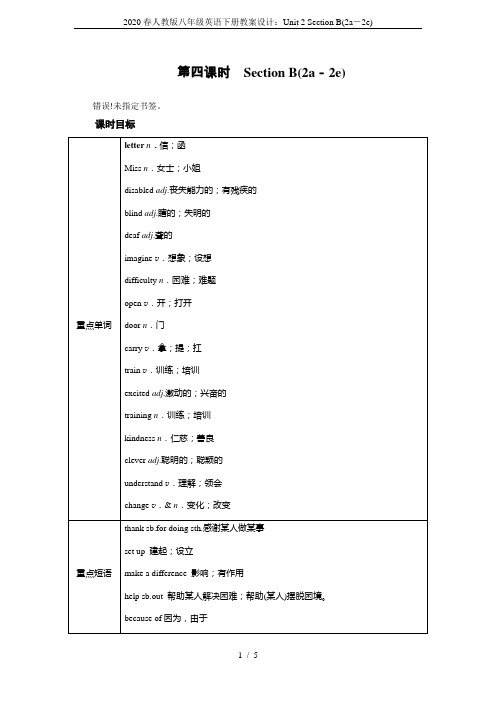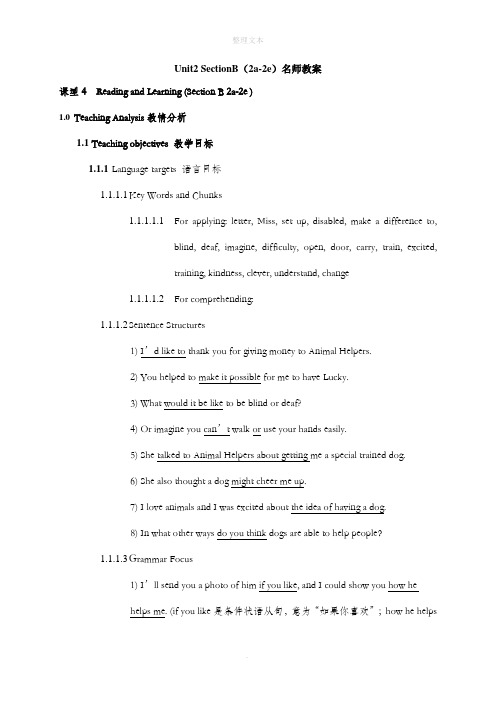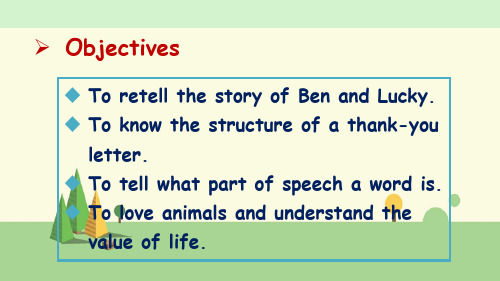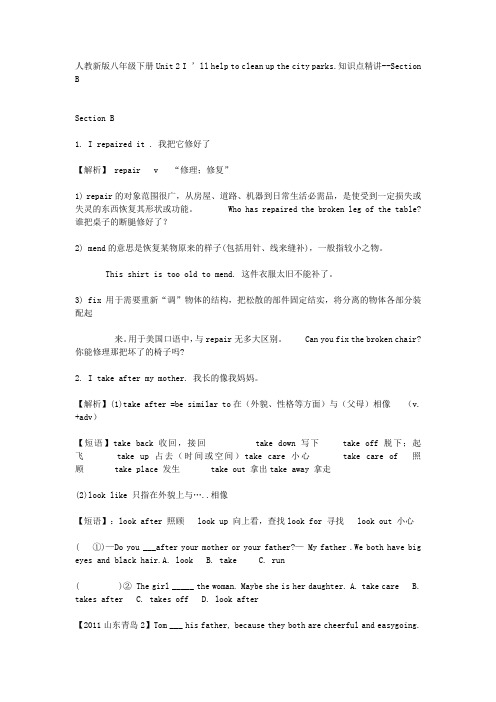英语人教版八年级下册Unit2 SectionB 2b
人教新目标版英语八年级下册Unit2SectionB2a-3b课件

Free talk
Should we help each other? Why? Do you often get some help from others in our daily life?
Group work
How do you usually thank someone who helps you? Discuss this with a partner. For example
4. imagine (v. / n.) I can hardly imagine such a scene. 5. difficulties (n. / adj.) Whenever we met with difficulties, they came to help us. 6. normal (adv. / adj.) It’s normal to feel nervous before an exam. 7. training (adv. / n.) His training fits him for the job. 8. kindness (n. / v.) He did it all out of kindness.
I want to take part in this group. 2. disabled (adj. / adv.)
Ada is always ready to help disabled people. 3. difference (adv. / n.)
I volunteer because I want not just to see the world, but to make a difference in it.
Task 4
2d Use the information in the letter to make true sentences by matching the different parts.
Unit 2 Section B 知识点 人教版八年级英语下册

辨析:take after, look like
要点精析
take after
指由于血缘关系而在外貌、性格方面 相似
look like 意为“看上去像”,只强调外表
例: Your daughter doesn't take after you at all. 你女儿一点儿都不像你。
You look like my younger brother. 你与我弟弟长得像。
“拿来”,指把人或物从别处带到说话者所 在的地方
“拿走”,指把人或物从说话者所在的地方 带到别处去
“去取来”,指到别处去把某人或某物带来 或拿来
例: Please carry this bag for me. 请为我提一下这个袋子。
You are welcome to bring your friend to the party. 欢迎你带你的朋友来参加聚会。
修理;装饰 建起;设立 赠送;捐赠 影响;有作用 (外貌或为)像
fix up set up give away make a difference take after
重点句型 1.我已用光它了。
I've run out of it. 2.我像我的母亲。
I take after my mother. 3.我把它修理好了。
重点单词
开;打开 拿;提;扛 训练;培训 激动的;兴奋的 训练;培训 仁慈;善良 聪明的;聪颖的 理解;领会 变化;改变 兴趣;使感兴趣
open carry train excited training kindness clever understand change interest
重点单词
重点短语
A. runs out of B. runs out
人教新目标八年级英语下册Unit2SectionB(2a2e)Reading教学设计

2.学生分享答案,教师点评并板书重点信息。
3.教师引导学生学习文章中的重点词汇和短语,如"challenge", "achieve", "commitment", "in addition", "as a result"等,并通过例句展示它们的用法。
人教新目标八年级英语下册Unit2SectionB(2a2e)Reading教学设计
一、教学目标
(一)知识与技能
1.学生能够理解并运用本章节阅读材料中出现的重点词汇和短语,如"challenge", "achieve", "commitment", "in addition", "as a result"等,并能准确运用这些词汇进行口语和书面表达。
2.学生分享自己的观点,教师引导总结:This picture reminds us of the challenges people face in achieving their goals. Today, we are going to read a story about someone who overcame difficulties and achieved success.
-制定针对性的学习计划,明确下一步的学习目标和改进措施。
-阅读后,写下自己的感想,思考如何将Helen Keller的精神运用到自己的学习和生活中。
4.家庭作业:
-与家长分享本节课学习的内容,讲述Helen Keller的故事,讨论她的品质和价值观。
-家长协助孩子完成口语作业的录制,鼓励孩子大胆开口,提高自信心。
2020春人教版八年级英语下册教案设计:Unit 2 Section B(2a-2e)

第四课时Section B(2a-2e)错误!未指定书签。
课时目标错误!未指定书签。
自主学习一、根据句意及汉语提示写出单词。
1.We should try our best to help disabled(残疾的)people.2.A blind(失明的)person can not see anything.3.I can hardly imagine(想象)such a scene.4.Jack is brave enough to face all the difficulties(困难).5.I am excited(激动的)about the idea of climbing mountains this weekend.二、写出下列画线短语的汉语意思。
1.I’m sure you know that this group was set up to help disabled people like me.建起;设立2.Lucky makes a big difference to my life.对……产生重大影响3.Then one day last year,a friend of mine helped me out.帮助……解决困难错误!未指定书签。
教学过程环节1新课导入1.Greetings.2.Ask students to look at the two pictures.Question:What can you do to help them?设计意图:以情境导入和图片展示的直观形式进行教学,引入本课时的话题,能够迅速抓住学生的眼球,激起学生的学习兴趣。
环节2学习2a-2e1.结对练习。
学生两人一组,讨论自己一般是怎么感谢他人帮助的。
教师邀请几名学生分享自己的观点。
2.让学生快速浏览2b中信的内容,掌握其主旨大意。
3.让学生浏览2b的两个问题,然后带着问题再次阅读短文,完成练习。
人教版八年级下册英语Unit2SectionB(2a2e)优秀教学案例

4.反思与评价的环节:通过引导学生对自己的学习过程进行反思,并设计具有针对性的评价任务,让学生在评价过程中巩固所学知识,提高了他们的语言运用能力和问题解决能力。
3.创设真实的学习情境,让学生在实际的语言环境中进行交流和表达,提高他们的语言运用能力。
(二)问题导向
1.设计具有启发性和思考性的问题,引导学生主动探究和思考,如:"How do you usually spend your weekend?" "What time do you usually go to school?"
在教学过程中,我以学生为中心,注重激发学生的学习兴趣和积极性,通过多样化的教学活动,帮助学生掌握语言知识,提高实际运用能力。同时,我遵循课程标准,注重培养学生的合作、探究和创新精神,使他们在语言学习的过程中,不断提高综合素质。
二、教学目标
(一)知识与技能
1.学生能够掌握并正确运用一般现在时描述日常习惯,如:"I usually watch TV after supper."
2.通过小组讨论和角色扮演,培养学生的合作能力和交际能力。
3.通过任务型教学法,引导学生主动探究、实践和创造,提高他们的语言运用能力。
(三)情感态度与价值观
1.激发学生对英语学习的兴趣,培养他们积极的学习态度和良好的学习习惯。
2.教育学生尊重他人,培养他们的团队合作精神,使他们在学习过程中能够互相帮助、互相学习。
5.全面的教学内容与过程:本节课从导入新课到讲授新知,再到学生小组讨论、总结归纳和作业小结,每一个环节都紧密结合,内容丰富且具有针对性,全面提高了学生的知识与技能、过程与方法、情感态度与价值观等方面的能力。
人教版英语八年级下册 Unit2_SectionB(2a-2e)教案

Unit2 SectionB(2a-2e)名师教案课型4 Reading and Learning (Section B 2a-2e )1.0Teaching Analysis教情分析1.1Teaching objectives 教学目标1.1.1Language targets 语言目标1.1.1.1Key Words and Chunks1.1.1.1.1For applying: letter, Miss, set up, disabled, make a difference to,blind, deaf, imagine, difficulty, open, door, carry, train, excited,training, kindness, clever, understand, change1.1.1.1.2For comprehending:1.1.1.2Sentence Structures1) I’d like to thank you for giving money to Animal Helpers.2) You helped to make it possible for me to have Lucky.3) What would it be like to be blind or deaf?4) Or imagine you can’t walk or use your hands easily.5) She talked to Animal Helpers about getting me a special trained dog.6) She also thought a dog might cheer me up.7) I love animals and I was excited about the idea of having a dog.8) In what other ways do you think dogs are able to help people?1.1.1.3Grammar Focus1) I’ll send you a photo of him if you like, and I could show you how hehelps me. (if you like是条件状语从句,意为“如果你喜欢”;how he helpsme是宾语从句,意为“他如何帮助我”)2) I’m su re you know that this group was set up to help disabled people likeme. (was set up是一般过去式的被动语态,一般过去时的被动语态的结构为“was/were+动词过去分词”)1.1.2Ability goals 能力目标1.1.2.1帮助学生通过单词的词性来帮助理解单词在句中的含义。
人教版英语八年级下册 Unit 2 Section B 2a-2e

feel very lucky to have him. You see, I’m only able to have a “dog helper” because of your kindness! Lucky is very clever and understands many English words. He can understand me when I give him orders. For example, I say, “Lucky! Get my book,” and he does it at once.
➢ Objectives
To retell the story of Ben and Lucky. To know the structure of a thank-you
letter. To tell what part of speech a word is. To love animals and understand the
SUBJECT
VERB
OBJECT
Miss Li
can get a letter to Miss Li.
Ben Smith Lucky
trains money to “Animal Helpers”.
sent animals like lucky.
Animal Helpers wrote things for disabled people.
What would it be like to be blind or deaf? Or imagine you can’t walk or use your hands easily. Most people would never think about this, but many people have these difficulties. I can’t use my arms or legs well, so normal things like answering the telephone, opening and closing doors, or carrying things are difficult for me. Then one day last year, a friend of mine helped
【英语】人教新版八年级下册Unit2Illhelptocleanupthecityparks知识点精讲-SectionB

人教新版八年级下册Unit 2 I ’ll help to clean up the city parks.知识点精讲--Section BSection B1. I repaired it . 我把它修好了【解析】 repair v “修理;修复”1) repair的对象范围很广,从房屋、道路、机器到日常生活必需品,是使受到一定损失或失灵的东西恢复其形状或功能。
Who has repaired the broken leg of the table? 谁把桌子的断腿修好了?2) mend的意思是恢复某物原来的样子(包括用针、线来缝补),一般指较小之物。
This shirt is too old to mend. 这件衣服太旧不能补了。
3) fix用于需要重新“调”物体的结构,把松散的部件固定结实,将分离的物体各部分装配起来。
用于美国口语中,与repair无多大区别。
Can you fix the broken chair? 你能修理那把坏了的椅子吗?2. I take after my mother. 我长的像我妈妈。
【解析】(1)take after =be similar to在(外貌、性格等方面)与(父母)相像(v. +adv)【短语】take back 收回,接回 take down 写下 take off 脱下;起飞take up 占去(时间或空间)take care 小心take care of 照顾take place 发生 take out 拿出take away 拿走(2)look like 只指在外貌上与…..相像【短语】:look after 照顾 look up 向上看,查找look for 寻找 look out 小心( ①)—Do you ___after your mother or your father?— My father .We both have big eyes and black hair.A. look B. take C. run( )② The girl _____ the woman. Maybe she is her daughter. A. take care B. takes after C. takes off D. look after【2011山东青岛2】Tom ___ his father, because they both are cheerful and easygoing.A. looks likeB. takes afterC. doesnt’ take afterD. isn’t like3. I fixed it up. 我把它修理好了。
- 1、下载文档前请自行甄别文档内容的完整性,平台不提供额外的编辑、内容补充、找答案等附加服务。
- 2、"仅部分预览"的文档,不可在线预览部分如存在完整性等问题,可反馈申请退款(可完整预览的文档不适用该条件!)。
- 3、如文档侵犯您的权益,请联系客服反馈,我们会尽快为您处理(人工客服工作时间:9:00-18:30)。
Unit 8 I’ll help clean up the city parks.(SectionB 2b) 教学设计该部分有四个模块:第一个模块围绕 ways in which you could help people这个话题展开叙述(1a),听力(1b),口语(1c)训练;第二个模块围绕 Talk about ways to tell people about the Clean-Up Day 进行听力(2a, 2b),口语(2c)训练;第三个模块是关于volunteers的一个阅读材料,训练形式为阅读(3a),填表格(3b),角色表演(3c);第四个模块仍以the kinds of work the volunteers do为话题,以表格及对话形式进行小组活动(4)。
Section B该部分有四个模块:第一模块是词汇的学习(1a)与运用(1b);第二个模块以听力训练形式强化第一模块中所学词汇(2a, 2b)和口语训练(2c);第三个模块围绕中心展开阅读(3a) a volunteer’s work 并再次强化了第一模块中的词汇学习(3b);第四模块仍就the work the volunteers do 这一话题以小组活动形式进行口语训练(4)。
Self check该部分有两个模块:第一模块对所学词汇进行填空训练(1);第二个模块以某一志愿者的活动为内容进行写作和口语练习(2)。
Reading该部分共设四项任务:第一项任务以问题讨论的形式激活相关的背景知识(Section 1);第二项任务要求学生通过快速阅读获取信息,并鼓励学生运用词性的知识阅读并理解短文内容(Section 2);第三项任务通过提炼阅读材料中的知识点和难点进一步理解文章(Section 3);第四项任务以写回信的形式对所学知识进行巩固运用(Section 4)。
2. 教材重组和课时分配Period 1: (Section A: 1a, 1b, 1c, 2a, 2b, 2c)New function presentingPeriod 2: (Section A: 3a, 3b, 3c, 4)PracticePeriod 3: (Section B: 1a, 1b, 2a, 2b, 2c, 3a, 3b, 4)Integrating skillsPeriod 4: (Section 1-Section 4)ReadingPeriod 5: (Self check: 1, 2)Self checkIII. Teaching plans for each period分课时教案Period 1 New function presentingLanguage goals语言目标1. Words & expressions生词和短语clean up, hunger, homeless, cheer up, give out, clean-up, sign, put off, set up, establish, major, commitment, veterinarian, coach2. Key sentences重点句子I’d like to work outside.You could help clean up the city parks.Ability goals能力目标Enable the Ss to talk about offering help.Enable the Ss to talk about the Clean-Up Day.Emotion & attitude goals情感和态度目标Enable the Ss to form a positive attitude to help others.Strategy goals策略目标To understand the target language by reading the pictures.Culture awareness goals 文化意识目标Being a volunteer is great!How to offer help to others.Teaching important points 教学重点Enable the Ss to talk about offering help.Teaching procedures and ways教学过程与方式Step I Lead-inT: In the last unit, we have learned “where would you like to visit”. If you asked me this question, I would say: I would like to visit Guilin. It is the place which I would like to visit most. Would you like to visit it?Ss: Yes. We would also like to visit it because of its beautiful scenery and kind people. T: Good. There are many tourist attractions in Guilin, so every year thousands of people visit it. But there are many visitors who throw waste cans and plastic bags here and there. As a result, many tourist attractions in Guilin have been polluted heavily. And the same thing has happened in other places all over the country. It is reported that an old woman from America helped clean up rubbish thrown by visitors on the Great Wall as a volunteer. And in our country there are many volunteers to do every kind of work to help others. Do you think being a volunteer is great?Ss: Yes, we have heard of many good deeds done by volunteers all over the country. They are great. They give people help without hope of reward.T: Then do you hope to become volunteers?Ss: Yes, we hope to become volunteers, thus, we can help many people who need help. T: I suggest you set up a volunteer group to try your best to help people. Now please open your books and turn to page 60. Look at the picture. What can you see in it? Ss: The two persons are talking about volunteer work.T: Good, please read the three posters in it. Who would like to read them to us?S1: Let me try. The first poster: Help clean up the city parks; The second: Visit sick children in the hospital; The third: Help stop hunger.T: Thank you. Besides the ways provided in the posters to help people, can you think of more other ways?S2: Help people stop smoking.S3: Help people keep away from drugs.S4: Visit old people in the old people’s house.T: There are some pictures about disabled people? What’s wrong with him?S1: He is blind.S2: He can’t use his legs.……T: Now let’s watch a video. (about a guide dog)What animal can help disabled people?Step II Ⅱ.Reading comprehension1. Who wrote the letter to Miss Li? Why?2. What did Miss Li do?1. The writer can’t use his arms or legs well.2. Lucky was brought to the writer by his friend.3. They have been trained at “Animal helpers”for seven months.4. A dog-helper is for those who are disabled.5. Lucky can understand different orders.1.What was Animal Helpers set up to do?2.What’s wrong with Ben Smith?3.What difficulties does Ben Smith have?4.Where does the dog come from?5.Why is his name Lucky?6.Can Lucky understand the writer when he gives him orders? Step III Consolidation1.为…而感谢2.为帮助残疾人而建立3.使得某人做某事成为可能4.对…产生影响;有作用5.考虑6.正常的事情7. 搬东西8. 对某人来说很困难9. 我的一位朋友10. 帮…摆脱困境11. 一只经过特殊训练的狗12. 振奋起来13.对…感到兴奋14.六个月的训练15.因为你的仁慈16.改变某人的生活StepⅣ. Extension1.Challenge masters2.Ben Smith thanks Miss Li for ______ (give) money to Animal Helpers, a groupthat helps ________(disable) people like Ben. Ben can’t do ma ny n______things like answering the telephone, opening and closing doors, or ________ (carry) things. Lucky is a special _______(train) dog. He can help many d_______people live more________(happy). Lucky is smart and can u__________ many English words. Lu cky makes a big d _________ to Ben’s life. He is helping toc______Ben’s life for the better.stepⅤ. SummarizeWords:imagine, disabled, difficulty, normal, kindness, difference, train, excited Phrases:set up, make a difference, be excited aboutSentences:1.This group was set up to help disabled people.2.you helped to make it possible for me to have Lucky.3.Lucky makes a big difference to my life.4.A friend of mine helped me out.5.She talked to Animal Helpers about getting me a special trained dog.6. Normal things like answering the telephone, opening and closing doors or carrying things are difficult for me.。
